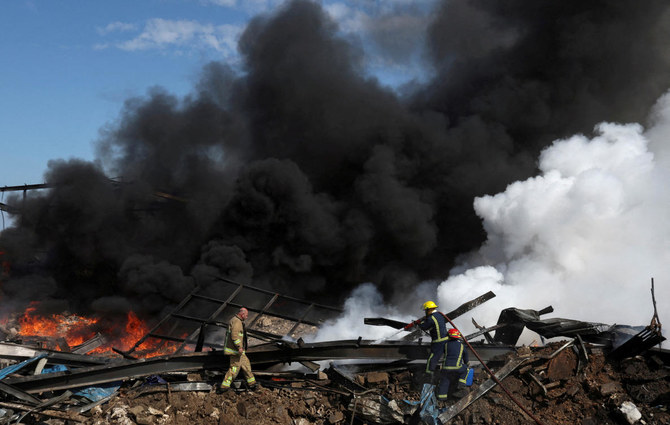BEIRUT: On Monday, the scope of the 142-day confrontation between Israel and Hezbollah Lebanon’s southern border expanded after Israeli warplanes raided two sites near the city of Baalbek.
The strikes on the city, deep in the Bekaa, killed two people and lead to numerous injuries among Hezbollah members, civilians, and Lebanese Armed Forces personnel.
A few hours later, an Israeli drone targeted a car in Al-Majadel plain in Tyre, southern Lebanon. Initial reports indicated that Hezbollah members were killed in the strike, but the identities of the victims are as yet unknown.
The raids, the first of their kind on an area west of the city of Baalbek, where Hezbollah centers are located, resulted in the deaths of Hussein Ali Younis, from Brital, and an as yet unnamed young man from the town of Chmistar.
Lebanese Army soldier Ali Fayyad Salem and his child, Joud, aged 4, were among four people injured.
The raids targeted two Hezbollah centers in the Adous plain in Bodai and in the town of Haouch Tall Safiyeh in the vicinity of Baalbek. Initial reports indicated that the two raids targeted “supply warehouses belonging to one of Hezbollah’s institutions.”
Locals shared pictures of smoke rising from the two sites on their mobile phones. A correspondent for Hezbollah’s Al-Manar TV said that one of the two raids “targeted an empty, three-story building.”
Hezbollah confirmed in its initial position that “the Israeli strike on Baalbek will not go without a response.”
Israel Defense Forces spokesman Avichay Adraee said on social media that the IDF “will continue to protect Israel and operate in Lebanese airspace against Hezbollah.”
Adraee acknowledged that “warplanes launched raids on complexes used by Hezbollah’s air defense unit in the Bekaa, in response to the firing of surface-to-air missiles at a Zik drone.”
Meanwhile, Hezbollah downed an Israeli drone in the Iqlim Al-Tuffah area using a surface-to-air missile.
The escalation on Monday began with Hezbollah’s air defense unit shooting down the drone that had been flying for hours over the Nabatieh and Iqlim Al-Tuffah areas, north of the Litani Line.
Two consecutive explosions were heard around 8:45 a.m., and dozens of people managed to capture images on their phones of white smoke in the sky of Iqlim Al-Tuffah, followed by the drone catching fire before crashing into a forested area nearby.
Hezbollah announced in a statement that “the drone was a Hermes 450 and was targeted with a surface-to-air missile above the Iqlim Al-Tuffah area, and it was seen falling with the naked eye.”
Israeli media confirmed that “an Israeli settler was injured by missile fragments during the shelling of Shtula with an anti-tank missile fired from Lebanon.”
The use of Israeli drones to carry out assassinations inside Lebanon marked a dangerous turning point in the ongoing conflict.
Israel has flown Hermes 900 drones over Lebanon, which weighs 350 kg and has various capabilities like surveillance, intelligence gathering and target acquisition. The drone has a laser, flies at 30,000 feet, can stay airborne for 36 hours, scanning vast areas.
Hermes 450 drones, like that shot down on Monday, have also often been used. This drone is designed for long-term tactical operations in the IDF’s reconnaissance and intelligence-gathering units.
Another drone deployed in Lebanon on Monday afternoon over the south was the Heron TP. This drone is considered “dangerous” and has used to carry out most drone-based assassinations in Lebanon.
Mohammed Raad, the leader of the Hezbollah parliamentary bloc, warned Israel that they would face severe consequences if they “miscalculate their actions towards us in Lebanon.”
Raad stressed that “the enemy’s pain is what makes them overreact at times, but they still adhere to the boundaries of deterrence established by the resistance with a great deal of discipline.”
He stated that the battle against Israel in Lebanon is “a crucial and delicate one, with its own strategic considerations. The aim “is to prevent the enemy from achieving their objectives, while the enemy seeks to draw us into a broader conflict to their advantage, exploiting tyrannic international support. We intend to lure the enemy into a battle on our terms and for our benefit.”



























